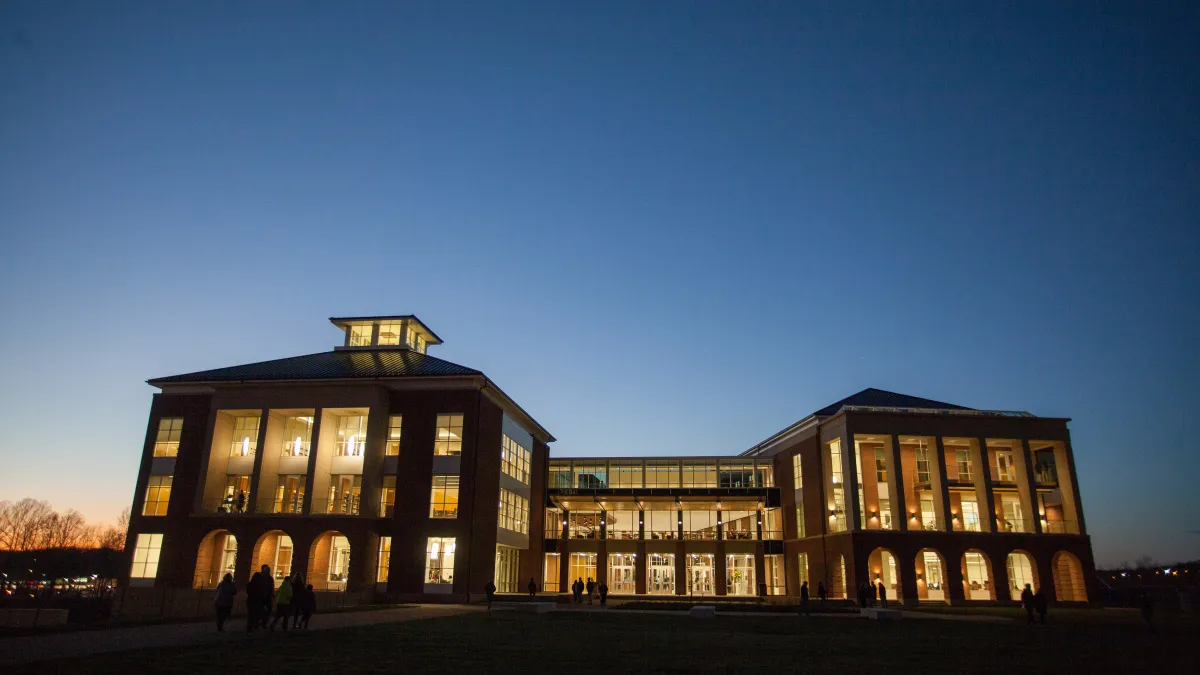Dive Brief:
-
Liberty University, an evangelical institution in Virginia, is being criticized for bucking national trends amid the coronavirus pandemic by inviting students to move back into campus residence halls.
-
The decision runs counter to recommendations of a vast contingent of health officials, who say avoiding large gatherings and maintaining social distancing measures are the best ways to stop the virus.
-
A majority of colleges have switched to online instruction during the crisis and ordered that campus residences be vacated.
Dive Insight:
As the coronavirus and the respiratory disease it causes, COVID-19, hit the U.S., most colleges moved classes and exams online and asked students to leave residence halls. Administrators generally made narrow exceptions for international students and those without easy access to housing.
But Jerry Falwell Jr., Liberty's president and a prominent evangelical leader, has attracted widespread criticism for defying those health measures by inviting thousands of students to return to dormitories this week.
Liberty officials considered extending spring break but felt students risked "having a longer time to become exposed to the virus and bring it back" to campus, Falwell said in a statement Monday. Falwell also instructed professors to report to campus, despite classes being taught virtually, The News and Advance reported.
The university did not respond to Education Dive's request for comment Tuesday, but a spokesperson told The Associated Press that about 1,100 students were on campus as of that morning.
On Monday, Virginia Gov. Ralph Northam issued a statewide executive order banning public gatherings of more than 10 people. To comply with the order, the university transformed the campus dining halls into takeout service and barred more than 10 students at a time from using fitness centers. South Carolina and Maryland are among the states enforcing similar bans, and some are ordering residents to stay home.
Oregon's governor has suspended in-person instruction at its colleges and universities, and leaders in other states have pressed their colleges to do the same.
The Centers for Disease Control and Prevention (CDC) has also said mass gatherings should be canceled.
Falwell noted in his statement that the Virginia Department of Health conducted a surprise inspection after Northam published his order, and the university was found to be in compliance with state requirements.
Still, the move to let students back into residence halls did not sit well with health officials, some of whom told Education Dive it is unwise to have students living in such close quarters.
"It's really reprehensible for a leader of the university to not only put the students at risk during a global health crisis, but also putting his faculty and staff at risk as well," Dean Winslow, a professor of medicine at Stanford University, said in an interview with Education Dive. Winslow said he was speaking as an individual, not on behalf of his university.
The CDC recommends keeping at least 6 feet between individuals to avoid spreading the disease, a feat that would be improbable with students living together, Winslow said.
The American College Health Association (ACHA), meanwhile, is emphasizing the CDC's guidance for postsecondary schools, which calls for colleges to reinforce good hygiene and intensify cleaning and disinfection efforts.
Students staying in dormitories and congregating in common areas could be at greater risk for spreading the disease than those in other small living settings, Michael Huey, ACHA's past president and member of its COVID-19 task force, told Education Dive in an email.
At issue in Liberty's case is the sheer number of students expected to return to campus, observers say. However, allowing a limited number of students to remain on campus out of necessity is not irresponsible, Winslow said, as many institutions are taking steps to ensure those students are practicing social distancing









